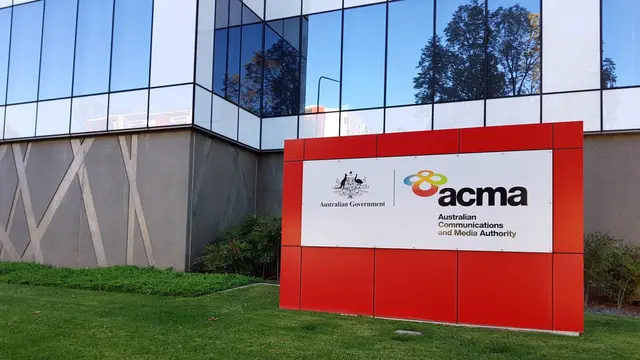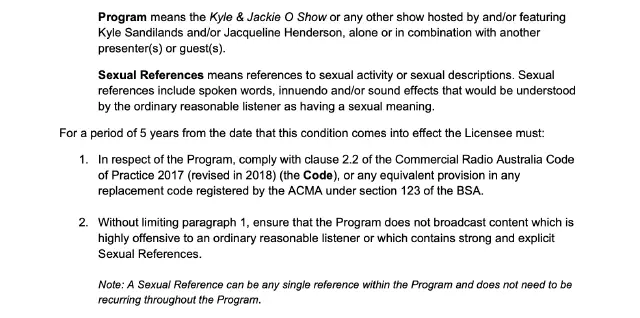What can the ACMA actually do about Kyle & Jackie O?

As an aside: I discover that “the ACMA” has a definite article. Ofcom doesn’t. The FCC does. NBC doesn’t. The BBC does. In the UK, the council does the bins. In Australia, Council does the bins. Ten years and I’m still a foreigner.
In recent weeks, I’ve expressed surprise how slowly the Australian media regulator, the ACMA, has acted regarding Kyle & Jackie O, a breakfast radio show that has repeatedly broadcast obscene material in spite of 16% of its audience being comprised of children.
It turns out that they’re not exactly given much regulatory power to move very quickly; and my previous experience in the UK is a very different regulatory framework.
I’m not a lawyer, but I find legal text quite easy to understand for some reason. And we need to read the legal text here, because the law is quite clear what the ACMA can do, and what it can’t. It’s all laid out in the Broadcasting Services Act 1992, the latest text of which is available here.
What the ACMA is supposed to do
¶ 3 sets out the aims of the Act. It’s written to ensure that broadcasting in Australia is “efficient, competitive and responsive to audience needs”, is diverse, is “high quality and innovative”, must “respect community standards”, and it must “place a high priority on the protection of children from exposure to program material which may be harmful to them”.
¶ 5 says that the ACMA is the body that has the responsibility for monitoring the broadcasting industry, in order that the Act’s aims are delivered.
OK, now we’ve understood what the aims are, let’s skip past how the licences are arranged and awarded and all that stuff.
Commercial radio licences, like community radio licences, operate under agreed codes of practice set by the industry body the CRA. The ACMA calls this a co-regulatory environment; but the codes of practices aren’t much more than agreements, rather than regulation.
So let’s get to the “licence conditions”.
Licence conditions
There are some conditions of broadcasting licences that are written out in the law. They’re in Schedule 2, which is on a separate page, and it’s about political advertising, elections, etc. Those aren’t generally within the ACMA’s powers to change. There are also rules around provision of news and information, and licence areas, and things like that.
If these conditions of a licence are breached, then the ACMA can take action (more of which below). None of all this mentions anything about content of programming when it comes to taste and decency.
But, in ¶ 43, the ACMA is given powers to impose additional conditions on any licence. And that’s what they’ve done here. They must publish those changes in the Gazette, whatever that is, but here are the proposed additional licence conditions for KIIS Sydney, and here they are for KIIS Melbourne.
When the ACMA has added these new licence conditions, only then are they able to take action if the radio station doesn’t follow those conditions.
What are these new licence conditions?

The main clause reads that KIIS must:
Ensure that the Program does not broadcast content which is highly offensive to an ordinary reasonable listener or which contains strong and explicit Sexual References. Note: A Sexual Reference can be any single reference within the Program and does not need to be recurring throughout the Program.
To be explicit (if you’ll pardon the word) that just a “single reference” is enough is, I think, a little draconian. In all the examples the ACMA gave of Kyle’s puerile output, the references were repeated over a prolonged period, and not just a side-quip. A five-minute example of “guess which member of the team is urinating” with detailed discussion of genitals is clearly not the same as a single reference - but this proposed licence condition makes it so.
Anyway, assuming it is incorporated into additional licence conditions…
What can the ACMA actually do?

Back to the main Broadcasting Services Act 1992, where in ¶ 143 (1), the ACMA is given the power to suspend the licence for up to three months, or the power to cancel the licence altogether.
They can’t say - “tell Kyle to take a month off”. They can’t require an on-air apology. They can’t give mandatory training. Under the law, the ACMA can’t do anything except literally turn off the radio station, either temporarily or permanently.
Can they fine the station? Yes, kind of, under ¶ 139 (3). The fine is made to the person “in a position to exercise control of the licence”, which I presume is the CEO of the company. That fine is “500 penalty units”, which is currently $165,000 (fines are set in penalty units in Australian law, so that inflation is easy to deal with). The person is liable for that fine every single day the licence conditions are breached.
But the ACMA can’t say “that was exceptionally bad, we’ll fine you $2mn”. And they can’t say “that was a minor thing, don’t do it again, have a fine of $5,000”. The fine is set, as 500 penalty units, under the law. That’s probably why the “code of practice” isn’t a licence condition.
Loopholes
I’m not a lawyer, but this action is being taken out on a licence in Sydney, which is technically owned by Commonwealth Broadcasting Corporation Pty Ltd. ARN also owns GOLD 101.7 in Sydney, technically owned by ARN Communication Pty Ltd. Commonwealth Broadcasting could decide to switch programming with ARN Communication. So, GOLD could go out on 106.5 - a licence with a condition that Kyle can’t say anything rude on it, while KIIS gets 101.7 and no such licence condition, letting Kyle be just as juvenile as he’s always been.
Similarly, ARN Communication Pty Ltd’s GOLD 104.3 and Double T Radio Pty Ltd’s KIIS 101.1 in Melbourne could just switch output, and shed the licence conditions.
Or, alternatively, Kyle could jump: he go back to 2DAY-FM in Sydney, a licence owned by Today FM Sydney Pty Ltd, and without any licence condition that he can’t be smutty.
Sounds too fanciful? The last time the ACMA imposed conditions on a licence because of Kyle & Jackie O, it was against 2Day FM - and they jumped ship to KIIS the next year, where those conditions did not apply to them.
But this is why the ACMA moves slow
The ACMA has powers; but the powers they’re given are pretty serious: to suspend a licence, or to terminate one. And that’s it.
No wonder they need to move slowly and carefully.
I’d argue they should have moved a long time ago; but we are where we are, and these new additional licence conditions seem pretty serious to me, all things considered.